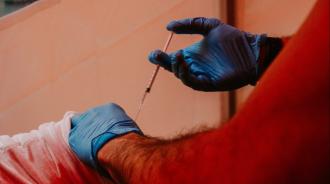For most of history, artificial intelligence (AI) has been relegated almost entirely to the realm of science fiction. Then, in late 2022, it burst into reality — seemingly out of nowhere — with the popular launch of ChatGPT, the generative AI chatbot that solves tricky problems, designs rockets, has deep conversations with users, and even aces the Bar exam.
But the truth is that before ChatGPT nabbed the public’s attention, AI was already here, and it was doing more important things than writing essays for lazy college students. Case in point: It was key to saving the lives of tens of millions of people.
AI-designed mRNA vaccines
As Dave Johnson, chief data and AI officer at Moderna, told MIT Technology Review‘s In Machines We Trust podcast in 2022, AI was integral to creating the company’s highly effective mRNA vaccine against COVID. Moderna and Pfizer/BioNTech’s mRNA vaccines collectively saved between 15 and 20 million lives, according to one estimate from 2022.
Johnson described how AI was hard at work at Moderna, well before COVID arose to infect billions. The pharmaceutical company focuses on finding mRNA therapies to fight off infectious disease, treat cancer, or thwart genetic illness, among other medical applications. Messenger RNA molecules are essentially molecular instructions for cells that tell them how to create specific proteins, which do everything from fighting infection, to catalyzing reactions, to relaying cellular messages.
Johnson and his team put AI and automated robots to work making lots of different mRNAs for scientists to experiment with. Moderna quickly went from making about 30 per month to more than one thousand. They then created AI algorithms to optimize mRNA to maximize protein production in the body — more bang for the biological buck.
For Johnson and his team’s next trick, they used AI to automate science, itself. Once Moderna’s scientists have an mRNA to experiment with, they do pre-clinical tests in the lab. They then pore over reams of data to see which mRNAs could progress to the next stage: animal trials. This process is long, repetitive, and soul-sucking — ill-suited to a creative scientist but great for a mindless AI algorithm. With scientists’ input, models were made to automate this tedious process.
All these AI systems were in put in place over the past decade. Then COVID showed up. So when the genome sequence of the coronavirus was made public in January 2020, Moderna was off to the races pumping out and testing mRNAs that would tell cells how to manufacture the coronavirus’s spike protein so that the body’s immune system would recognize and destroy it. Within 42 days, the company had an mRNA vaccine ready to be tested in humans. It eventually went into hundreds of millions of arms.
Biotech harnesses the power of AI
Moderna is now turning its attention to other ailments that could be solved with mRNA, and the company is continuing to lean on AI. Scientists are still coming to Johnson with automation requests, which he happily obliges.
“We don’t think about AI in the context of replacing humans,” he told the Me, Myself, and AI podcast. “We always think about it in terms of this human-machine collaboration, because they’re good at different things. Humans are really good at creativity and flexibility and insight, whereas machines are really good at precision and giving the exact same result every single time and doing it at scale and speed.”
Moderna, which was founded as a “digital biotech,” is undoubtedly the poster child of AI use in mRNA vaccines. Moderna recently signed a deal with IBM to use the company’s quantum computers as well as its proprietary generative AI, MoLFormer.
Moderna’s success is encouraging other companies to follow its example. In January, BioNTech, which partnered with Pfizer to make the other highly effective mRNA vaccine against COVID, acquired the company InstaDeep for $440 million to implement its machine learning AI across its mRNA medicine platform. And in May, Chinese technology giant Baidu announced an AI tool that designs super-optimized mRNA sequences in minutes. A nearly countless number of mRNA molecules can code for the same protein, but some are more stable and result in the production of more proteins. Baidu’s AI, called “LinearDesign,” finds these mRNAs. The company licensed the tool to French pharmaceutical company Sanofi.
Writing in the journal Accounts of Chemical Research in late 2021, Sebastian M. Castillo-Hair and Georg Seelig, computer engineers who focus on synthetic biology at the University of Washington, forecast that AI machine learning models will further accelerate the biotechnology research process, putting mRNA medicine into overdrive to the benefit of all.
This article was reprinted with permission of Big Think, where it was originally published.






